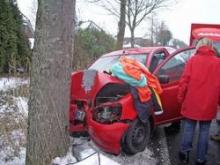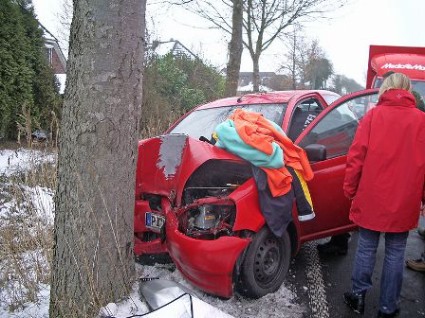User login
Boston emergency department physicians are now reporting impaired motorists for possible driver’s license revocation.
Over a 16-month period, 31% of admitted drivers were impaired. Of these, 17 were considered medically unqualified to drive, and 86 needed further medical evaluation.
"The vast majority of patients believe they’ll be reported [to authorities] if they arrive at the hospital impaired or under the influence, but that is not the case in Massachusetts, or in most other states from what we’ve found," according to trauma surgeon Eric Mahoney, who helped develop the reporting protocol.
Many health care personnel resist such reporting because they fear a lawsuit or retaliation. The Massachusetts Safe Driving Law of 2010 has changed the landscape by expanding the ability of health care providers and law enforcement to report drivers whom the health care providers believe are unfit to drive because of cognitive or functional impairment. The reports are sent to the Registry of Motor Vehicles (RMV), not the police.
"This has never been meant to be punitive," noted Dr. Mahoney of the department of trauma and emergency services at Boston Medical Center.
The intent has always been to get impaired drivers to visit their physicians to adjust their medication if needed, reevaluate their medical condition, or, if impairment results from substance abuse, counsel them. It’s been shown that the more contact patients have with health care, the more successful they will be at managing their health problems, he said at the annual scientific assembly of the Eastern Association for the Surgery of Trauma (EAST).
The protocol may also reduce motor vehicle crashes by having recidivists held accountable for their actions.
"In our state, the acquittal rate is close to 90% for first-time DUI offenders, so we know the current system in place really isn’t working," according to study coauthor Lisa Allee, Boston Medical Center’s injury prevention coordinator. "So our goal is to reduce recidivism and get people the help they need," she said.
Dr. Mahoney and his colleagues used the Massachusetts RMV definition of impaired driving and vetted HIPPA compliance through the hospital’s legal department. A physician can request that the RMV medical advisory board seek medical evaluation of a driver when the physician has a good faith belief of impairment based on personal observation, physical examinations, or laboratory studies. The request cannot be based on driver age or previous diagnosis.
When the accident involves substance abuse, reporting is limited to instances of a "violent/high risk" to the public such as driving in the wrong direction of traffic, speed exceeding 55 mph, having a child or loaded firearm in the car, or fleeing from police
In the 16-month study period, 363 motor vehicle–crash drivers were admitted to the ED, of which 114 (31%) were impaired and 90% met the "dangerousness" requirement, Dr. Mahoney reported. Their average age was 42 years, 60% were white, 23% were black, 8% were Hispanic, and 41% had private commercial insurance.
Of those reported as being impaired, 18% were incapacitated by a medical condition, 78% were impaired because of substance use, and 3% were incapacitated by both.
Syncope and seizure were the most common medical conditions causing impairment (50% and 25%), followed by about 5% each of narcolepsy, brain lesion, respiratory failure, dizziness, dementia, normal pressure hydrocephalus, and cerebrovascular accident.
Alcohol was the most common substance causing impairment, present in more than 80% of cases, followed by a benzodiazepine, cocaine, and other prescriptions, he said.
"Impairment is common in drivers admitted to the trauma center, and 90% are violent, dangerous to the public," Dr. Mahoney said. "We need to encourage and empower others to report."
The topic of impaired drivers was on the radar of other EAST investigators. Dr. Felicia Ivascu of the Beaumont Health System in Royal Oak, Mich., reported that 11% of the 541 crash victims treated from 2008 to 2010 at their level I trauma center were legally intoxicated. Moreover, data available on 52 of these drivers revealed these patients cost the hospital $5.2 million in total charges, which accounts for 12% of all charges for drivers.
Michigan is one of 12 states to have no-fault automobile insurance, and the only one that provides unlimited medical benefits. Because of the high costs, House Bill 5588 was recently introduced to remove no-fault benefits if a person is found driving while intoxicated or impaired at the time of the accident, regardless of responsibility.
The dilemma, however, is that passage of the bill would reduce net revenue, and "this will lead to a large financial burden for hospitals that treat intoxicated drivers, requiring them to either absorb this cost or pass it on to Medicaid," the authors wrote.
Dr. Mahoney, Dr. Ivascu, and their coauthors reported no relevant financial disclosures.
Boston emergency department physicians are now reporting impaired motorists for possible driver’s license revocation.
Over a 16-month period, 31% of admitted drivers were impaired. Of these, 17 were considered medically unqualified to drive, and 86 needed further medical evaluation.
"The vast majority of patients believe they’ll be reported [to authorities] if they arrive at the hospital impaired or under the influence, but that is not the case in Massachusetts, or in most other states from what we’ve found," according to trauma surgeon Eric Mahoney, who helped develop the reporting protocol.
Many health care personnel resist such reporting because they fear a lawsuit or retaliation. The Massachusetts Safe Driving Law of 2010 has changed the landscape by expanding the ability of health care providers and law enforcement to report drivers whom the health care providers believe are unfit to drive because of cognitive or functional impairment. The reports are sent to the Registry of Motor Vehicles (RMV), not the police.
"This has never been meant to be punitive," noted Dr. Mahoney of the department of trauma and emergency services at Boston Medical Center.
The intent has always been to get impaired drivers to visit their physicians to adjust their medication if needed, reevaluate their medical condition, or, if impairment results from substance abuse, counsel them. It’s been shown that the more contact patients have with health care, the more successful they will be at managing their health problems, he said at the annual scientific assembly of the Eastern Association for the Surgery of Trauma (EAST).
The protocol may also reduce motor vehicle crashes by having recidivists held accountable for their actions.
"In our state, the acquittal rate is close to 90% for first-time DUI offenders, so we know the current system in place really isn’t working," according to study coauthor Lisa Allee, Boston Medical Center’s injury prevention coordinator. "So our goal is to reduce recidivism and get people the help they need," she said.
Dr. Mahoney and his colleagues used the Massachusetts RMV definition of impaired driving and vetted HIPPA compliance through the hospital’s legal department. A physician can request that the RMV medical advisory board seek medical evaluation of a driver when the physician has a good faith belief of impairment based on personal observation, physical examinations, or laboratory studies. The request cannot be based on driver age or previous diagnosis.
When the accident involves substance abuse, reporting is limited to instances of a "violent/high risk" to the public such as driving in the wrong direction of traffic, speed exceeding 55 mph, having a child or loaded firearm in the car, or fleeing from police
In the 16-month study period, 363 motor vehicle–crash drivers were admitted to the ED, of which 114 (31%) were impaired and 90% met the "dangerousness" requirement, Dr. Mahoney reported. Their average age was 42 years, 60% were white, 23% were black, 8% were Hispanic, and 41% had private commercial insurance.
Of those reported as being impaired, 18% were incapacitated by a medical condition, 78% were impaired because of substance use, and 3% were incapacitated by both.
Syncope and seizure were the most common medical conditions causing impairment (50% and 25%), followed by about 5% each of narcolepsy, brain lesion, respiratory failure, dizziness, dementia, normal pressure hydrocephalus, and cerebrovascular accident.
Alcohol was the most common substance causing impairment, present in more than 80% of cases, followed by a benzodiazepine, cocaine, and other prescriptions, he said.
"Impairment is common in drivers admitted to the trauma center, and 90% are violent, dangerous to the public," Dr. Mahoney said. "We need to encourage and empower others to report."
The topic of impaired drivers was on the radar of other EAST investigators. Dr. Felicia Ivascu of the Beaumont Health System in Royal Oak, Mich., reported that 11% of the 541 crash victims treated from 2008 to 2010 at their level I trauma center were legally intoxicated. Moreover, data available on 52 of these drivers revealed these patients cost the hospital $5.2 million in total charges, which accounts for 12% of all charges for drivers.
Michigan is one of 12 states to have no-fault automobile insurance, and the only one that provides unlimited medical benefits. Because of the high costs, House Bill 5588 was recently introduced to remove no-fault benefits if a person is found driving while intoxicated or impaired at the time of the accident, regardless of responsibility.
The dilemma, however, is that passage of the bill would reduce net revenue, and "this will lead to a large financial burden for hospitals that treat intoxicated drivers, requiring them to either absorb this cost or pass it on to Medicaid," the authors wrote.
Dr. Mahoney, Dr. Ivascu, and their coauthors reported no relevant financial disclosures.
Boston emergency department physicians are now reporting impaired motorists for possible driver’s license revocation.
Over a 16-month period, 31% of admitted drivers were impaired. Of these, 17 were considered medically unqualified to drive, and 86 needed further medical evaluation.
"The vast majority of patients believe they’ll be reported [to authorities] if they arrive at the hospital impaired or under the influence, but that is not the case in Massachusetts, or in most other states from what we’ve found," according to trauma surgeon Eric Mahoney, who helped develop the reporting protocol.
Many health care personnel resist such reporting because they fear a lawsuit or retaliation. The Massachusetts Safe Driving Law of 2010 has changed the landscape by expanding the ability of health care providers and law enforcement to report drivers whom the health care providers believe are unfit to drive because of cognitive or functional impairment. The reports are sent to the Registry of Motor Vehicles (RMV), not the police.
"This has never been meant to be punitive," noted Dr. Mahoney of the department of trauma and emergency services at Boston Medical Center.
The intent has always been to get impaired drivers to visit their physicians to adjust their medication if needed, reevaluate their medical condition, or, if impairment results from substance abuse, counsel them. It’s been shown that the more contact patients have with health care, the more successful they will be at managing their health problems, he said at the annual scientific assembly of the Eastern Association for the Surgery of Trauma (EAST).
The protocol may also reduce motor vehicle crashes by having recidivists held accountable for their actions.
"In our state, the acquittal rate is close to 90% for first-time DUI offenders, so we know the current system in place really isn’t working," according to study coauthor Lisa Allee, Boston Medical Center’s injury prevention coordinator. "So our goal is to reduce recidivism and get people the help they need," she said.
Dr. Mahoney and his colleagues used the Massachusetts RMV definition of impaired driving and vetted HIPPA compliance through the hospital’s legal department. A physician can request that the RMV medical advisory board seek medical evaluation of a driver when the physician has a good faith belief of impairment based on personal observation, physical examinations, or laboratory studies. The request cannot be based on driver age or previous diagnosis.
When the accident involves substance abuse, reporting is limited to instances of a "violent/high risk" to the public such as driving in the wrong direction of traffic, speed exceeding 55 mph, having a child or loaded firearm in the car, or fleeing from police
In the 16-month study period, 363 motor vehicle–crash drivers were admitted to the ED, of which 114 (31%) were impaired and 90% met the "dangerousness" requirement, Dr. Mahoney reported. Their average age was 42 years, 60% were white, 23% were black, 8% were Hispanic, and 41% had private commercial insurance.
Of those reported as being impaired, 18% were incapacitated by a medical condition, 78% were impaired because of substance use, and 3% were incapacitated by both.
Syncope and seizure were the most common medical conditions causing impairment (50% and 25%), followed by about 5% each of narcolepsy, brain lesion, respiratory failure, dizziness, dementia, normal pressure hydrocephalus, and cerebrovascular accident.
Alcohol was the most common substance causing impairment, present in more than 80% of cases, followed by a benzodiazepine, cocaine, and other prescriptions, he said.
"Impairment is common in drivers admitted to the trauma center, and 90% are violent, dangerous to the public," Dr. Mahoney said. "We need to encourage and empower others to report."
The topic of impaired drivers was on the radar of other EAST investigators. Dr. Felicia Ivascu of the Beaumont Health System in Royal Oak, Mich., reported that 11% of the 541 crash victims treated from 2008 to 2010 at their level I trauma center were legally intoxicated. Moreover, data available on 52 of these drivers revealed these patients cost the hospital $5.2 million in total charges, which accounts for 12% of all charges for drivers.
Michigan is one of 12 states to have no-fault automobile insurance, and the only one that provides unlimited medical benefits. Because of the high costs, House Bill 5588 was recently introduced to remove no-fault benefits if a person is found driving while intoxicated or impaired at the time of the accident, regardless of responsibility.
The dilemma, however, is that passage of the bill would reduce net revenue, and "this will lead to a large financial burden for hospitals that treat intoxicated drivers, requiring them to either absorb this cost or pass it on to Medicaid," the authors wrote.
Dr. Mahoney, Dr. Ivascu, and their coauthors reported no relevant financial disclosures.
AT THE EAST SCIENTIFIC ASSEMBLY
Major Finding: Over a 16-month period, 31% of drivers were impaired because of a medical condition or substance abuse.
Data Source: Retrospective analysis of a prospective impaired driver reporting protocol.
Disclosures: Dr. Mahoney, Dr. Ivascu, and their coauthors reported no relevant financial disclosures.



